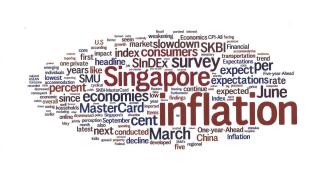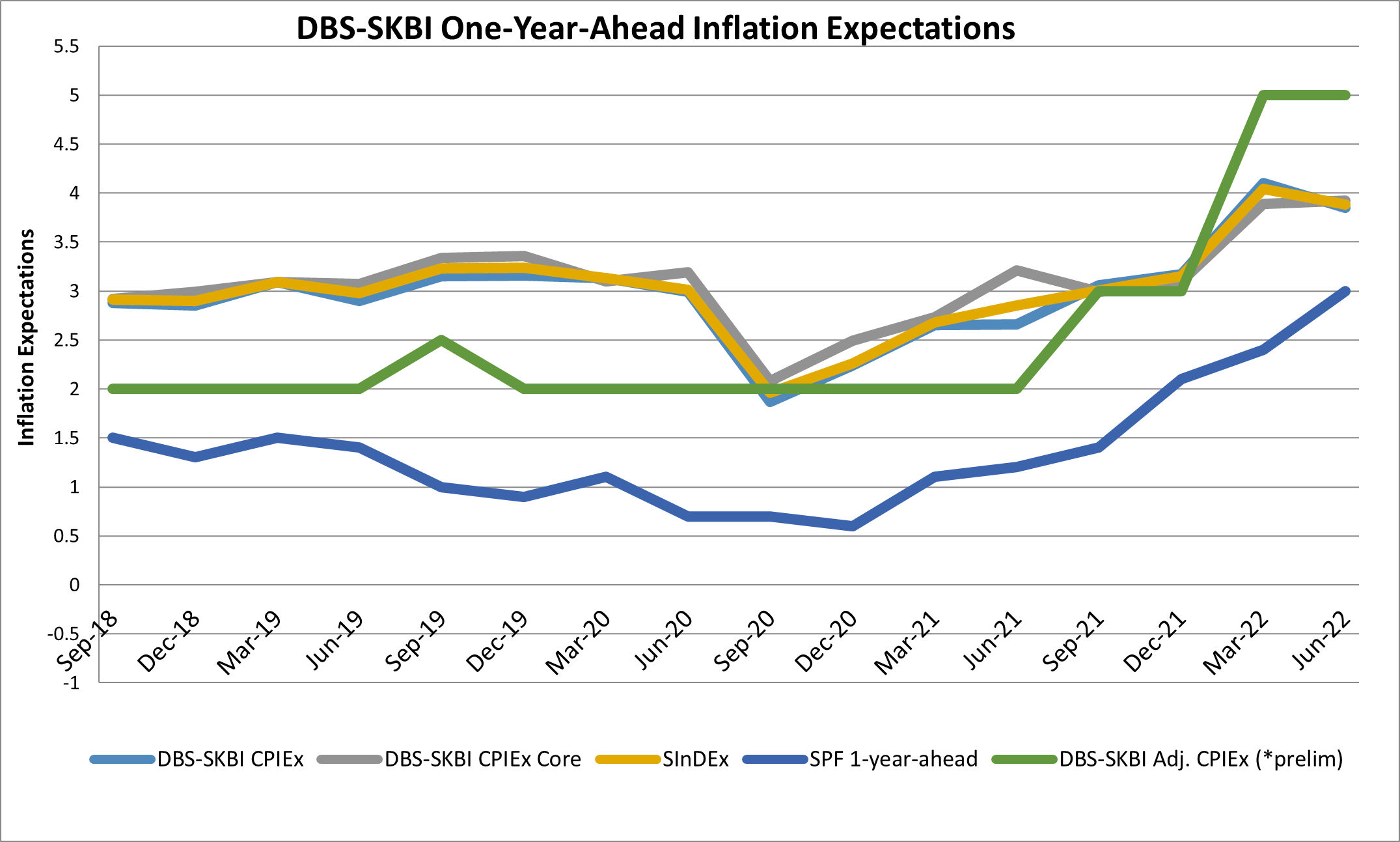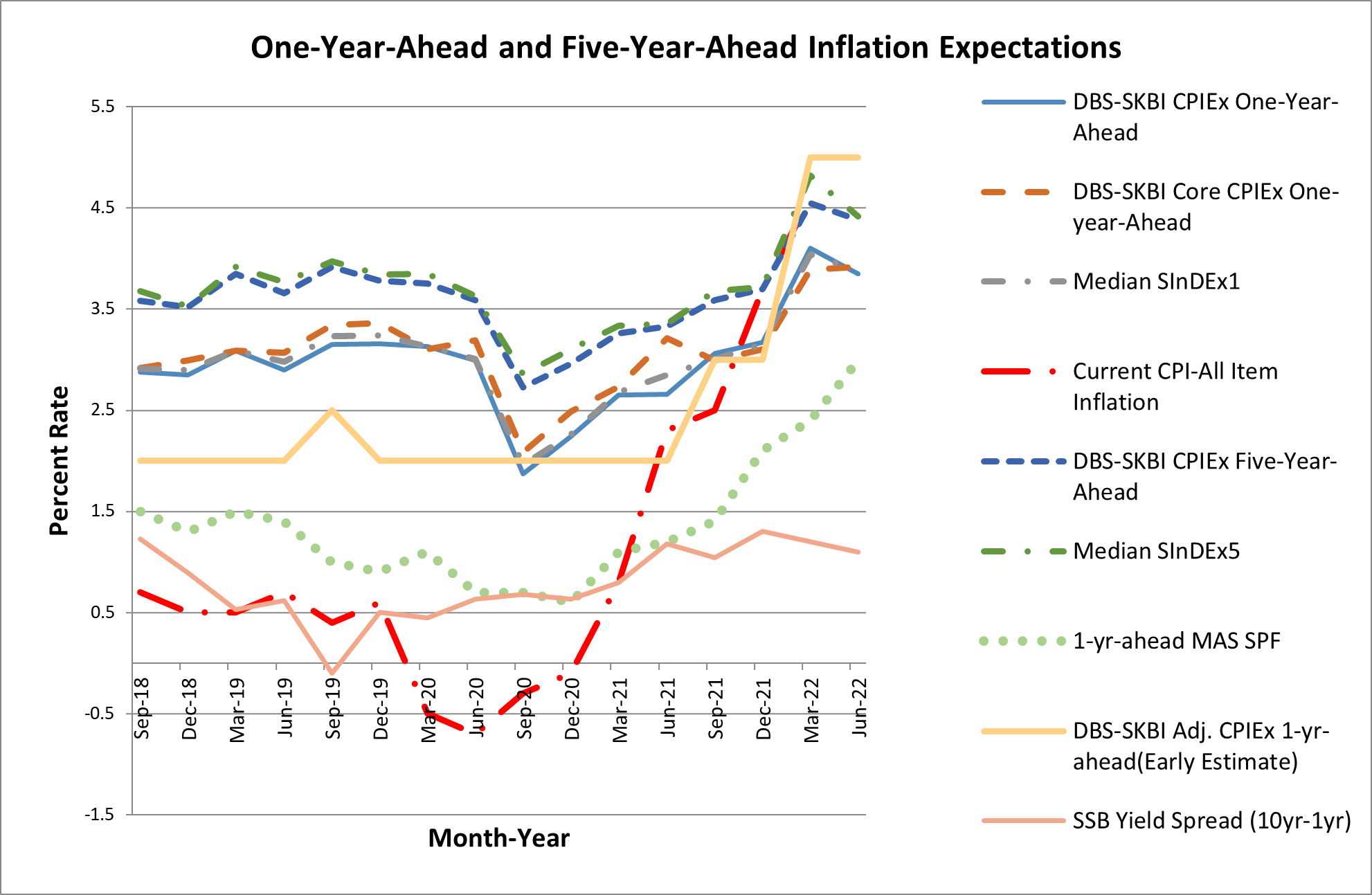
- One-year-Ahead headline inflation expectations reduced to 3.9% in June 2022, compared to 4.1% in March 2022. Headline inflation expectation saw a dip in the upward trend since September 2020. However, it is still a higher reading than the historical (2012-2021) second quarter average of 3.3%, and just shy of the 4% rate exceeded in March 2022, for the first time since December 2012.
- As a comparison benchmark, the Monetary Authority of Singapore Survey of Professional Forecasters (MAS SPF) data released in June 2022 showed that the median forecasts of CPI All-Items inflation for 2023 was 3% and MAS Core inflation was 2.8%. The latest release from Department of Statistics showed that average CPI-All Items in January–May i2022 was 5.0%, compared to the same period in 2021, while the latest May 2022 monthly inflation was 5.6%, year on year. On 14 July 2022, MAS further tightened monetary policy in an off-cycle move by re-centring the mid-point of the S$ nominal effective exchange rate (S$NEER) policy band up to its prevailing rate. This was the fourth consecutive tightening move since October 2021. It sought to build on previous monetary policy tightening moves to slow the momentum of inflation and ensure medium-term price stability.
- The overall CPIEx Inflation Expectations, after adjusting for potential component-wise behavioural biases and re-combining across components, slightly decreased to 5.5% in June 2022 from 5.7% in March 2022. Inflation expectations of all individual components remained the same as the last quarter at 5.0%, except Transportation inflation which saw a slight decline in inflation expectations to 8.0% from 9.0% polled in the March 2022 survey.
- We also observed that the free response behaviourally adjusted overall inflation expectations remained at 5.0% in June 2022, unchanged from March 2022. Multiple global factors and ground realities faced by consumers seem to be the main drivers of such expectations formation adjusting for behavioural bias like “anchoring bias.”
- In the June 2022 wave, we took a more forward looking approach to analyse the impact of global economic developments on Singapore’s economic growth and inflation.
- Overall, despite policy stabilisation to assuage the impact of the pandemic, given the global uncertainty and economic disruptions, Singaporean consumers felt that the pandemic will have a moderately negative impact on Singapore’s economic growth.
- Singaporean consumers also felt they will have to dole out slightly higher amount on spending owing mainly to price increases despite possible cutbacks on consumption.
- We found that the impact on inflation for Transport, Healthcare, Housing is expected to be slightly negative.
- In addition, the impact on overall One-year- Ahead inflation and Five-year -Ahead inflation is expected toto be negative but limited.
- There is however some divergence among respondents regarding the impact on inflation expectations for certain components including food, healthcare, clothing & footwear, where we find a distinct bimodal distribution.
- Following the academic work by Alberto Cavallo of Harvard Business School (2020) and the UK Office of National Statistics (ONS), respondents were asked if there were any substantive changes to their consumption basket. In June 2022, results suggest there is no change in most of the components, exceptions being Food, Housing and Utilities and Household Durables and Services - which are expected to see limited increase. This perhaps indicates that even though their One-year-Ahead inflation expectations are somewhat reducing, their allocation to consumption basket will increase, for these specific components. The overall impact might increase their spending slightly as is reflected in the analysis.
- Excluding accommodation and private road transportation related costs, the One-year-Ahead CPIEx core inflation expectations remained at 3.9% in June 2022, similar to overall inflation expectations.
- For a subgroup of the population who owns their accommodation and uses public transport, the One-year-Ahead CPIEx core inflation expectations reduced from 3.9% in March 2022 to 3.8% in June 2022. This sub-sample measurement is potentially more representative than the full sample measurement, due to high homeownership and public transport ridership in Singapore. This downward paring though is marginal and the level is in line with the overall inflation expectations and has been largely flat, despite strong growth in housing prices leading to further property cooling measures from policymakers in December 2021.
- The One-year-Ahead composite index SInDEx1 that puts less weight on more volatile components like accommodation, private road transport, food and energy related expenses polled at 3.9% in March 2022, a slight decrease from the 4.0% figure polled in March 2022. It is significantly higher than the average of 3.3% since the survey’s inception in 2012 till 2021.
- In addition, around 11.5% of the Singaporeans polled expect a more than 5.0% reduction in salary in the next 12 months. This is a lower proportion compared to 12.1% in March 2022. The median salary increment expectation changed to an increase by 1.0-5.0%
- As a measure of the tradeoff between prioritising economic growth compared to the cost to life, the so-called livelihood over life debate, the ratio was 3.4 in June 2022, higher than 3.3 in March 2022. This means for every person who prioritised life over livelihood, there are more than three who prioritised livelihood over life. This also indicates the level of divergence among Singaporeans - some feel the economy should be reopened fully to generate some semblance of growth and create jobs; while others feel that protecting lives should be given utmost priority, but this group is reducing a little and is stabilising.
DBS Chief Economist and Managing Director of Group Research, Dr. Taimur Baig commented, “Globally, Inflation has proven to be higher and stickier than considered likely even a few months ago, but that has yet to undermine long-term anchoring of inflation expectation in industrial economies. Singapore has been no exception, where inflation expectations have incorporated recent developments, but survey respondents express no particular alarm over the prospects of price movements in the long-run. The MAS, with its spate of four policy tightening measures since last October, has shown its resolve to keep inflation steady by deploying its suite of tools. A combination of stronger Singapore dollar, tighter domestic liquidity, and macro prudential measures in place would go a long way in keeping inflation expectations anchored, in our view.”
SKBI Director Professor Dave Fernandez commented, “With actual inflation printing higher, central bankers and markets are paying close attention to all measures of inflation expectations. Notably, in the US, after raising the Fed Funds target by 75bp, Chair Powell specifically cited the University of Michigan inflation expectations survey, saying the June reading was “quite eye-catching and we noticed that.” So far, Singapore’s inflation expectations have risen but remain anchored. The clear risk is that, without vigilant policy actions, current price pressures could bleed into expectations, making it more likely that inflation becomes more persistent.”
SMU Assistant Professor of Finance and founding Principal Investigator of the DBS-SKBI SInDEx Project, Aurobindo Ghosh highlighted, “The global economy is at a crossroads. An ominous ‘stagflation’ scenario can be detrimental to global growth even if a global recession is averted warned the World Bank in its June 2022 Global Economic Prospects report. Being a small open economy, Singapore is fairly exposed to all the headwinds afflicting the global economy including the supply chain disruptions as well as the Ukraine-Russia conflict which are escalating global inflation as evidenced from four decade high inflation in the US and have darkened global growth outlook as is evident from the stuttering growth in major economies like China. Preemptive tightening of monetary policy by the Monetary Authority of Singapore might have dampened the unhinged increase in inflation expectations, as the DBS-SKBI SInDEx inflation expectations survey suggests. However, the heightened level of uncertainty rising from the continuing conflict in Ukraine is having a debilitating impact on global production of food grains and other commodities, increase in global oil prices and potential slowdown in major economies. These might have caused the free response behaviourally adjusted inflation expectations to be significantly higher, particularly due to cognitive biases in surveys. This cognitive dissonance is reduced when we look at those respondents with higher levels of financial literacy having slightly lower inflation expectations.”
For the longer horizon, the Five-year-Ahead CPIEx inflation expectations decreased from 4.8% in the March 2022 survey to 4.5% in June 2022. The current polled number is higher than the second quarter average of 4.0% since the survey’s inception in 2012 till 2021.
The Five-year-Ahead CPIEx core inflation expectations (excluding accommodation and private road transportation related costs) also decreased to 4.3% in June 2021 from 4.6% in March 2022. Overall, the composite Five-year-Ahead SInDEx5 also decreased to 4.4% in March 2022, from 4.8% in March 2022. In comparison, the second quarter average value (since the survey’s inception in 2012 till 2021) of the composite Five-year-Ahead SInDEx5 is 3.9%.
“There are some silver linings to the generally gloomy global economic outlook. First, we find that compared to March 2022 survey, the June 2022 survey showed a decline in the long term 5-year-Ahead inflation expectations though still above the historical average. Second, there is more stabilisation in the life vs livelihood debate where for every person choosing life over livelihood, about 3.4 choose livelihood over life, almost unchanged from the March 2022 survey. Finally, the survey indicated that while Singaporeans feel overall economic growth will be dampened moderately in the medium term, they are expecting that some price increases might lead to slightly higher expense with some adjustment in consumption baskets. This is signalling that we have approached a new normal of endemic Covid-19 and hopefully some degree of anchoring of long term inflation expectations,” Prof Ghosh commented.
Methodology
DBS-SKBI SInDEx survey yields CPIEx Inflation Expectations (estimating headline inflation expectations) and related indices are products of the online survey of around 500 randomly selected individuals representing a cross section of Singaporean households. The survey is led by Principal Investigator Dr. Aurobindo Ghosh, Assistant Professor of Finance (Education) at Lee Kong Chian School of Business, SMU. The online survey, powered by Agility Research and Strategy, helps researchers understand the behaviour and sentiments of decision makers in Singaporean households. DBS Group Research is a co-sponsor and research partner with the Sim Kee Boon Institute for Financial Economics (SKBI) at SMU.
The quarterly DBS-SKBI SInDEx survey has also yielded two composite indices, SInDEx1 and SInDEx5. SInDEx1 and SInDEx5 measure the One-year inflation expectations and the Five-year inflation expectations, respectively. The sampling was done using a quota sample over gender, age and residency status to ensure representativeness of the sample. Employees in some sectors like journalism and marketing were excluded as that might have an effect on their responses to questions on consumption behaviour and expectations.
The DBS-SKBI SInDEx survey was augmented in June 2018, based on a joint research study conducted by SMU researchers in collaboration with MAS and the Behavioral Insights Team, where respondents were polled on their perceptions of components of the Consumers Price Index (CPI) and adjusted for possible behavioural biases prevalent in online surveys.
Based on the recommendations of the joint study, since March 2019 the research team has polled the One-year-Ahead inflation expectations of all of the major components of CPI-All Items inflation. For June 2022 survey, DBS-SKBI CPIEx headline inflation expectations index declined slightly and Core CPIEx indices remained largely flat compared to March 2022. The behaviorally adjusted component-wise inflation expectations has remained the same for all components except for Transport which declined slightly from March 2022, causing the overall behaviourally adjusted indices to decline slightly. In free response answers, compared to March 2022 survey, respondents in the June 2022 survey polled One-year Ahead and Five-year Ahead headline and core inflation expectations remained the same.
We introduced a new ratio in the June 2020 survey, on the life versus livelihood debate as an aftermath of the Covid 19 pandemic - the ratio of respondents who feels livelihood should be prioritised over life vis-à-vis those who feel the other way. This ratio remained similar from 3.3 in March 2022, to 3.4 in June 2022, which means for every respondent who prioritised life over livelihood, there were more than 3 who prioritised livelihood over life, signaling a level of stabilisation though there are still divergent groups.

